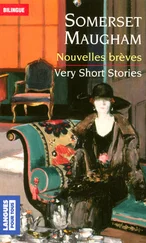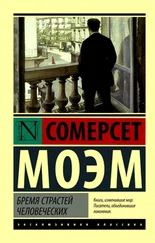| And what made it worse was that there seemed no end to his wretchedness; Singer was only eleven and would not go to the upper school till he was thirteen. |
Но хуже всего было то, что страданиям его, казалось, не будет конца: Певуну исполнилось всего одиннадцать лет, а в приготовительных классах он пробудет до тринадцати. |
| Philip realised that he must live two years with a tormentor from whom there was no escape. |
Филип знал, что ему суждено целых два года прожить с палачом, от которого не было спасения. |
| He was only happy while he was working and when he got into bed. |
Он был счастлив только во время уроков и когда ложился в постель. |
| And often there recurred to him then that queer feeling that his life with all its misery was nothing but a dream, and that he would awake in the morning in his own little bed in London. |
И по вечерам к нему часто возвращалось странное чувство, что жизнь его со всеми ее бедами -только сон и утром он проснется в своей кроватке в Лондоне. |
| XIII |
ГЛАВА 13 |
| Two years passed, and Philip was nearly twelve. |
Прошло два года, и Филипу было уже около двенадцати лет. |
| He was in the first form, within two or three places of the top, and after Christmas when several boys would be leaving for the senior school he would be head boy. |
Учился он в первом классе, шел вторым или третьим учеником, и после рождества, когда несколько мальчиков перейдут из его класса в Королевскую школу, он станет первым. |
| He had already quite a collection of prizes, worthless books on bad paper, but in gorgeous bindings decorated with the arms of the school: his position had freed him from bullying, and he was not unhappy. |
У него уже скопилась целая коллекция наград (никому не нужные книги на скверной бумаге, хотя и в роскошных переплетах, украшенных гербом школы). Завоеванное положение спасало его от издевательств, и жизнь больше не казалась такой уж тяжкой. |
| His fellows forgave him his success because of his deformity. |
Товарищи прощали ему успехи за его хромоту. |
| "After all, it's jolly easy for him to get prizes," they said, "there's nothing he CAN do but swat." |
- Подумаешь! Кэри сам бог велел получать награды,- говорили они.- Что ему еще делать, как не зубрить?.. |
| He had lost his early terror of Mr. Watson. |
Страх его перед мистером Уотсоном пропал. |
| He had grown used to the loud voice, and when the headmaster's heavy hand was laid on his shoulder Philip discerned vaguely the intention of a caress. |
Он привык к его львиному рыку, и, когда на плечо его опускалась тяжелая рука директора, Филип угадывал в этом прикосновении ласку. |
| He had the good memory which is more useful for scholastic achievements than mental power, and he knew Mr. Watson expected him to leave the preparatory school with a scholarship. |
У него была отличная память, что куда важнее для хорошего ученика, нежели умственные способности, и он знал, что мистер Уотсон рассчитывает выпустить его из приготовительной школы со стипендией. |
| But he had grown very self-conscious. |
Но Филип постоянно чувствовал себя настороже. |
| The new-born child does not realise that his body is more a part of himself than surrounding objects, and will play with his toes without any feeling that they belong to him more than the rattle by his side; and it is only by degrees, through pain, that he understands the fact of the body. |
Младенец не отдает себе отчета в том, что тело его принадлежит ему больше, чем окружающие предметы; он играет пальцами ноги, не чувствуя, что они - часть его самого и чем-то отличаются от висящей рядом погремушки; лишь постепенно, испытав боль, ребенок начинает ощущать самостоятельное существование своего тела. |
| And experiences of the same kind are necessary for the individual to become conscious of himself; but here there is the difference that, although everyone becomes equally conscious of his body as a separate and complete organism, everyone does not become equally conscious of himself as a complete and separate personality. |
Индивидууму, чтобы осознать свое "я", необходим такой же опыт; однако разница заключается в том, что всякий человек ощущает свое тело как особый и самостоятельный организм, но отнюдь не каждый осознает свое "я" как самостоятельную и независимую личность. |
| The feeling of apartness from others comes to most with puberty, but it is not always developed to such a degree as to make the difference between the individual and his fellows noticeable to the individual. |
Ощущение отчужденности от других приходит обычно с половой зрелостью, но не всегда развивается до такой степени, чтобы отличие индивидуума от окружающих стало заметно ему самому. |
| It is such as he, as little conscious of himself as the bee in a hive, who are the lucky in life, for they have the best chance of happiness: their activities are shared by all, and their pleasures are only pleasures because they are enjoyed in common; you will see them on Whit-Monday dancing on Hampstead Heath, shouting at a football match, or from club windows in Pall Mall cheering a royal procession. |
И вот людям, так же мало осознающим свое "я", как пчелы в улье, суждена в жизни удача: им куда чаще выпадает счастье, ведь их бытие делит с ними все общество, их радости только потому и становятся радостями, что ими тешатся сообща; такие люди пляшут в духов день на Хэмстед-хид, орут на футбольном матче, машут из окон клубов на Пелл-Мелл королевскому кортежу. |
| It is because of them that man has been called a social animal. |
Это благодаря им человека прозвали общественным животным. |
| Philip passed from the innocence of childhood to bitter consciousness of himself by the ridicule which his club-foot had excited. |
Филип шагнул от простодушия младенчества к горькому ощущению своего "я", подгоняемый насмешками, которым подвергалась его хромота. |
| The circumstances of his case were so peculiar that he could not apply to them the ready-made rules which acted well enough in ordinary affairs, and he was forced to think for himself. |
Условия его существования были необычны; к ним нельзя было применить ходячие правила, и ему волей-неволей приходилось думать самостоятельно. |
| The many books he had read filled his mind with ideas which, because he only half understood them, gave more scope to his imagination. |
Он прочел множество книг, и в голове его роились мысли, которые он еще и сам не вполне понимал; может, поэтому они так будоражили его воображение. |
| Beneath his painful shyness something was growing up within him, and obscurely he realised his personality. |
Болезненная застенчивость делала его замкнутым, но в душе у него что-то созревало. И он смутно начинал отдавать себе отчет в том, что он -личность. |
| But at times it gave him odd surprises; he did things, he knew not why, and afterwards when he thought of them found himself all at sea. |
По временам эта личность самого его удивляла: он совершал безотчетные поступки и, раздумывая о них потом, так и не мог их себе объяснить. |
| There was a boy called Luard between whom and Philip a friendship had arisen, and one day, when they were playing together in the school-room, Luard began to perform some trick with an ebony pen-holder of Philip's. |
Он подружился с мальчиком по фамилии Люард, и однажды, когда они вдвоем играли в классе, Люард стал показывать какой-то фокус с ручкой из черного дерева, принадлежавшей Филипу. |
| "Don't play the giddy ox," said Philip. "You'll only break it." |
- Брось валять дурака,- сказал Филип.- Ты ее сломаешь. |
| "I shan't." |
- Не сломаю. |

![Уильям Макгиверн - Завтра опять неизвестность [английский и русский параллельные тексты]](/books/35168/uilyam-makgivern-zavtra-opyat-neizvestnost-angli-thumb.webp)


